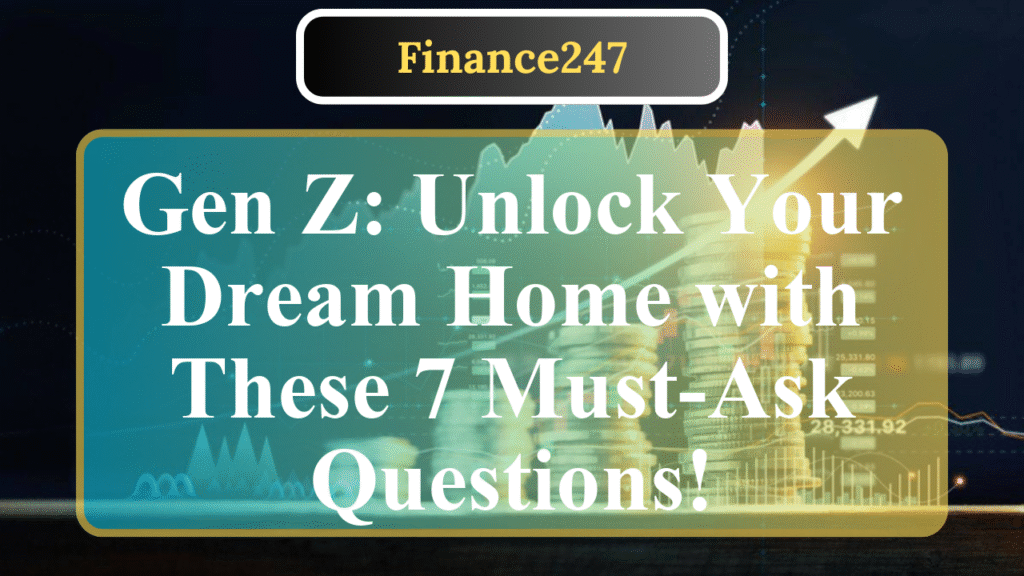“Gen Z homebuyers can navigate the mortgage process confidently by asking the right questions. This article outlines seven critical questions to ask lenders, covering loan types, interest rates, down payments, fees, and more, ensuring informed decisions for first-time buyers.”
Key Questions for Gen Z Homebuyers
Navigating the mortgage process as a first-time homebuyer can be daunting, especially for Gen Z, who are entering the housing market with unique financial considerations. Asking the right questions can help clarify options and secure favorable terms. Here are seven essential questions Gen Z should ask their mortgage lender to make informed decisions.
What Mortgage Options Are Best for My Financial Situation?
Lenders offer various loan types, such as conventional, FHA, VA, or USDA loans, each with different requirements. For instance, FHA loans require as little as 3.5% down and are ideal for those with lower credit scores, while conventional loans may need 3%–20% down but offer flexibility. Ask your lender to evaluate your income, credit score (ideally 620 or higher for conventional loans), and debt-to-income (DTI) ratio (preferably under 43%) to recommend the best fit. Understanding the pros and cons of fixed-rate versus adjustable-rate mortgages (ARMs) is also critical, as ARMs may start with lower rates but can fluctuate, impacting monthly payments.
What Is the Annual Percentage Rate (APR) and What Fees Are Included?
The APR reflects the total cost of borrowing, including the interest rate and fees like origination or closing costs. Unlike the interest rate alone, the APR provides an apples-to-apples comparison across lenders. Ask if discount points—fees paid upfront to lower the interest rate—are included in the APR. For example, paying 1 point (1% of the loan amount) on a $200,000 mortgage costs $2,000 but may reduce your rate, saving money over time. Ensure the lender provides a Loan Estimate within three business days of application, detailing all costs.
How Much Down Payment Do I Need, and Are There Assistance Programs?
Down payment requirements vary: 0% for VA/USDA loans, 3.5% for FHA, and 3%–20% for conventional loans. A 20% down payment avoids private mortgage insurance (PMI), which costs 0.46%–1.5% of the loan amount annually. Gen Z buyers, often with limited savings, should inquire about down payment assistance programs, such as state or local grants, forgivable loans, or employer-based aid. Lenders should clarify eligibility based on income and location.
What Are the Closing Costs, and Can They Be Negotiated?
Closing costs, including appraisal, title, and origination fees, typically range from 2%–5% of the loan amount. For a $300,000 loan, this could be $6,000–$15,000. Ask for a detailed breakdown via the Loan Estimate and whether fees like origination costs are negotiable. Some lenders may offer discounts for first-time buyers or those enrolling in automatic payments, potentially reducing costs.
Can I Lock in the Interest Rate, and What Are the Terms?
Mortgage rates fluctuate daily based on market conditions, with recent data showing 30-year fixed rates averaging around 6.5%–7% in 2025. A rate lock protects against increases during the loan process, typically lasting 30–60 days. Ask about the lock duration, extension fees (if closing is delayed), and whether you can secure a lower rate if market rates drop before closing. This is crucial for budgeting, as a 0.5% rate increase on a $250,000 loan can add $100+ to monthly payments.
What Documentation Is Required for Approval?
Lenders need proof of income (pay stubs, W-2s, tax returns), employment history (typically two years), bank statements, and credit reports. Self-employed Gen Z buyers may need additional documents like business licenses or T1 generals. Ask for a checklist to streamline the process and avoid delays. Preapproval, which involves a credit check and financial review, provides a clearer loan amount estimate and strengthens offers in competitive markets.
Who Will Service My Loan After Closing?
Some lenders sell loans to third-party servicers, who handle payments and customer service. Knowing who services your loan ensures you understand where to direct payments or questions. Ask if the lender retains servicing rights or if the loan may be sold, as this can affect communication and flexibility, like making overpayments without penalties.
By asking these questions, Gen Z can approach homeownership with clarity, ensuring they select a mortgage that aligns with their financial goals and avoids unexpected costs.
Disclaimer: This article is for informational purposes only and does not constitute financial advice. Consult a qualified financial advisor or mortgage lender for personalized guidance. Information is sourced from industry standards, lender practices, and publicly available data.


